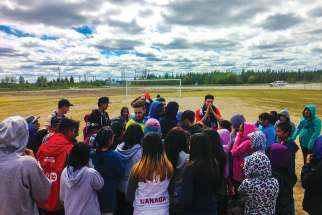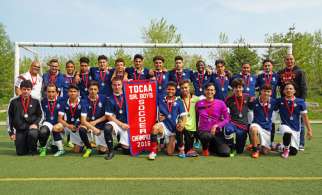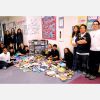Anthony Macedo is used to playing soccer with intensity, but nothing prepared the 18-year-old goalkeeper for the emotions that spilled out when his school’s club travelled to Attawapiskat last year.
TORONTO – A Catholic high school soccer team from Toronto is using its passion for the game to make a difference in the lives of youth in the troubled Attawapiskat First Nations community in northern Ontario.
OTTAWA – Canadians Catholic bishops, Catholic organizations and pro-life groups are concerned about the Liberal government’s assisted suicide Bill C-14, especially given the tragedy at Attawapiskat.
Victoria Island becomes place of pilgrimage to support Chief Spence
OTTAWA - Victoria Island where Chief Theresa Spence has been holding a nearly month-long hunger strike to demand a meeting with the Prime Minister and Governor General to discuss First Nations’ issues has become a pilgrimage site for supporters from across North America.
Binding Attawapiskat’s wounds
For MP Charlie Angus, the important part of the Good Samaritan story is that the Good Samaritan came back. He didn’t just bind up the traveller’s wounds and go on his way.
TORONTO - Alex Morlando finally met Nathan Louttit, the Attawapiskat native he’s been communicating with through letters, the Internet and Xbox since they were both in Grade 7.
“Our teacher assigned us pen pals and (said) we would have to communicate through letters,” said Morlando, now in Grade 8 at Toronto’s Our Lady of Fatima Catholic School. “We started off like that and then we started communicating a little more through Xbox and the Internet. That’s how I really got to know Nathan.”
Vincentians aid Attawapiskat
A house is just a big container. It’s what you put in it that makes it a home. The St. Vincent de Paul Society at St. Kevin’s in Val Therese, Ont., knows the difference.
The Vincentians inspired parishioners at St. Kevin’s and their fellow Vincentians around the province to contribute $24,000 to help furnish pre-fab houses going to the native community of Attawapiskat, Ont.
TORONTO - In his Grade 9 art class at Fr. John Redmond Catholic Secondary School in west end Toronto, Roman Makuch is drawing beavers, turtles and geese, trying to see through aboriginal eyes and express himself with First Nations’ symbols. The semester dedicated to studying aboriginal art is not easy, Makuch tells a visitor. But he believes it’s valuable.
“We’re all Canadian,” he said. “We’re all proud of being Canadian and part of our past is aboriginal.”
Grade 12 student Radiyah Chowthury spent last year reading aboriginal authors in her Grade 11 University Enriched Natives Studies English class at Blessed Mother Teresa Catholic Secondary School in Toronto’s Malvern community. She can’t imagine not studying aboriginal authors. As an immigrant kid, she’s unwilling to settle for a history of Canada that begins and ends with European sailors bumping into a big, cold land mass on their way to India.
Fatima students witness to Christ in aiding Attawapiskat brethren
TORONTO - There is the poverty, the high cost of food, lack of clean water and acceptable housing, the lack of concern for the people’s wellbeing, the high rate of disease and of course the whole situation around the school. Nobody has the silver bullet that will fix education in Attiwapiskat in northern Ontario.
But that doesn’t mean we do nothing. Mother Teresa most often gets credit for telling us that we’re not called to be successful. We’re called to be faithful.
As a Toronto Catholic District School Board teacher, I’ve been working with Attawapiskat for 10 years. It started when I was a literacy resource teacher heading up our early reading intervention program. The principal of Attiwapiskat’s JR Nakogee School contacted me. The challenge at his school was and still is raising the literacy skills.
UN to hear of 'shameful' conditions for native children
TORONTO - A half-dozen aboriginal youth headed for Geneva have shameful things to say about Canada and how it treats First Nations children. But their testimony before the United Nations Committee on the Rights of the Child will be given in the hope that Canada can do better, the young delegates told media in Toronto Feb. 2.
"There's been talk for years and years and years. If there's just going to be more talk, I wouldn't consider that a success," said 24-year-old John-Paul Chalykoff from the Michipicoten First Nation on the north shore of Lake Superior.
Crown, First Nations’ covenants must be retained
OTTAWA - The historic Crown-First Nations Gathering revealed stark differences on how the relationship between Canada’s founding peoples and the government, embodied in the Indian Act, should continue.
And whatever is resolved, an advisor to the Catholic Church said, must re-affirm historic treaties signed between the two.
It is about recognizing the sacred importance of covenants, said Gerry Kelly at the one-day gathering held in Ottawa Jan. 24. Kelly is the former director of the Canadian Conference of Catholic Bishops’ secretariat on aboriginal affairs and now advises Catholic entities regarding the Indian Residential Schools legacy.
“Our whole understanding of our relationship with God is understood scripturally in terms of covenants,” said Kelly. “We understand what it means. A covenant is sacred. We can’t hold that position and not recognize the covenant relationship established by treaties. It is timeless and it is binding.”
Assembly of First Nations National Chief Shawn Atleo called the Indian Act “a breach” of the government’s commitment to First Nations peoples that was “built on a disgraceful premise of our inferiority.”
“It is well past time that we began to undo the damage that Act has inflicted on our peoples, and to our partnership,” Atleo said, noting it formed the basis for the reserve system, residential schools and prohibitions of spiritual and cultural practices.
Prime Minister Stephen Harper, however, promised an incremental approach to remedying some problems inherent in the Act, but bluntly stated his government had “no grand scheme to repeal or to unilaterally re-write the Indian Act.”
“After 136 years, that tree has deep roots. Blowing up the stump would just leave a big hole,” Harper told the more than 150 First Nations leaders at the gathering. “However, there are ways, creative ways, collaborative ways, ways that involve consultation between our government, the provinces and First Nations leadership and communities, ways that provide options within the Act, or outside of it, for practical, incremental and real change.”
The gathering was called to find ways to improve the relationship between Canada’s First Nations’ people and the federal government. It had been planned for some time, with the date finalized during the period in late 2011 when images of the poverty on Canada’s reserves were brought to the forefront with the poor housing conditions that plagued Attawapiskat in Northern Ontario.
Kelly said incremental approaches are not problematic in themselves.
“So much of this depends on good intentions and fairness,” he said. The challenge in the past has been with First Nations and bands being pressured “to give up their full rights for a limited parcel of rights.”
The other problems with an incremental approach are strictly practical, he said.
“The longer this process takes, the more resources are taken from First Nations lands in the context where their rights to resources and benefiting from those resources are ignored.”
Aboriginal entrepreneur and consultant David Acco, a Catholic and Montreal-based member of the Cree First Nation, said the gathering could not have taken place in the 1960s or ’70s with the kind of aboriginal inclusiveness of today. Aboriginal people have developed the leadership abilities and legal skills to put them in a better position to negotiate, he said.
Acco, president of Acosys Consulting, said a long-term vision is needed that takes into consideration how current negotiations will affect future generations.
“I don’t think aboriginal people are going to get another opportunity to right the wrongs of the past like we have now in another 100 years,” Acco said.
He also raised concerns about incremental approaches creating a hierarchy of “haves” and “have-nots” that will see some First Nations rewarded and others, like Attawapiskat, left behind. Communities like Attawapiskat need the Indian Act for their survival, Acco said, because of the fiduciary responsibility the Crown has to First Nations. An incremental approach decentralizes and potentially fragments any unity among First Nations, he said.
The gathering’s “outcome statement” affirmed principles in the Joint Action Plan the government and First Nations developed in June 2011 that included improving relationships and partnerships “respectful of aboriginal and treaty rights,” transparent and accountable governance, empowering success through education and opportunity, promoting self-sufficient communities and assisting economic development that will benefit all Canadians.
The statement called for immediate action on a renewed relationship that includes multi-year funding, improved financial accountability on the part of all with the goal of First Nations financial self-sufficiency. It affirmed an incremental approach to “removing barriers to First Nations governance,” by working around and through existing mechanisms in the Indian Act, which cannot be replaced overnight,”and committed both parties to “respect and honour our treaty relationship and advance approaches to find common ground on treaty implementation.”
Gathering offers opportunity to reset First Nations relations
OTTAWA - Winnipeg Archbishop James Weisgerber believes that “rebalancing the relationship” between First Nations peoples and the government may be the most important issue in Canada today.
To that end, he hopes the Jan. 24 summit in Ottawa between First Nations leaders and the federal government will finally address what he calls the “tremendous inequalities and great suffering” of Canada’s aboriginal peoples.
“The federal government has a lead role,” Weisgerber said. “We arrived (and) we made treaties that are supposed to be the basis on which we share coming together.”
Northern reserves suffer a poverty of spirit
MOOSE FACTORY, ONT. - Poverty. No clean water supply. No electricity. No heating. Lack of proper housing. Lack of education. Minimal health resources. Suffering. Hopelessness. Loud cries for help. And yet no one is listening. No one is paying attention. No one is showing care and compassion.
This may sound like a Third World, developing country, but, no, this is Canada. This is the Canada that so many people do not know exists and is ignored. Until recently, I was one of these people.
I am a registered nurse who has served in impoverished villages in Nigeria and the shantytowns surrounding the cities of Lima, Peru, and Guayaquil, Ecuador. I have experienced much poverty in my travels, but I have also experienced hope, courage and love. Although these people may seem to lack the basics, they have so much more. It is a poverty of material, not of spirit.
Attawapiskat local pastor wants to know where all the money goes
It’s a good thing the federal government wants to know where millions of dollars given to the Attawapiskat community has gone, Fr. Rodrigue Vézina told The Catholic Register on the phone from the Northern Ontario reserve. Since 2007, the government has given more than $90 million to the struggling community.
“All of us want to check where all of our tax money is going,” said Vézina, an Oblate missionary and pastor of St. Francis Xavier parish in Attawapiskat, supported by Catholic Missions In Canada.
The small isolated town near the western shore of James Bay received international attention when Chief Theresa Spence declared a state of emergency in October as temperatures began to drop. For at least the past two years, many residents have lived in makeshift tents and shacks without heat, electricity or indoor plumbing.
Show genuine care
Before Canada’s federal and First Nations leaders hold a summit in late January to address the shameful state of native reserves, they should read Megan Blair’s plea for help in this issue of The Register.
They should feel the pain, share the despair and experience the sorrow she witnesses daily. A registered nurse in Moose Factory, Ont., Blair’s patients include the sick and dying from Attawapiskat, the small northern village that is Canada’s new symbol of neglect for its First Nations peoples.
“The poverty is immense,” she writes. “But it is not just a poverty of material things. It is a poverty of spirit. There is so much hopelessness and suffering.”















